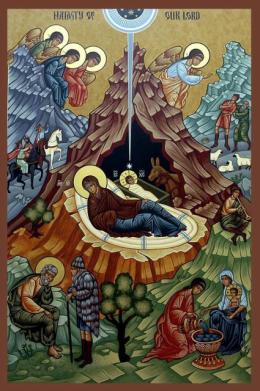For this post we have a guest author, Maximus Tan, writing about the book “Thirsting for God in a land of shallow wells” by Matthew Gallatin. For Malaysians, it might be easiest to access the eBook through Ancient Faith Publishing’s website.

Thirsting for God in a Shallow Wells is a book about Matthew Gallatin’s journey in various forms and denominations of Christianity, including Seventh-Day Adventist, Non-denominational, Charismaticism, Roman Catholicism, and more. The book also deals with his journey back to Orthodoxy, the history of the Orthodox faith, and his research on the early Church. It also contains a basic introduction to Orthodoxy.
This book starts off by his emerging doubts about the protestant concepts such as Sola Scriptura, in which scripture alone is the complete authority in everything Christian. The author also struggles with relativism in Protestantism, and the idea of “truth” as a rational thing, that is discovered and evaluated by applying one’s faculty of understanding to the Scriptures.
Being a man himself who has been in so many different denominations in Protestantism, Matthew begun to wonder, “what then is ultimate truth?” In Protestantism, it seemed to be that there can be no ultimate truth, since truth is derived from the interpretation of the Bible from each individual person. And it is evident because denominations within Protestantism hold to different views in different issues, each claims to hold the truth. Yet their versions of truth conflict, despite their common insistence on Sola Scriptura.
Some hold to the totality of God’s sovereignty over all aspects of creation including the predetermination of who will or not be saved, to the extent that human free will does not have any influence in this matter. On the other hand, some hold the completely opposite view. So even though a group of Protestants might agree that “We are saved by grace through faith in Christ alone”, each denomination interprets and views those words very differently. Slowly, the author began to question his faith and doctrines, even whether he is truly a Christian, since the doctrines and understandings of God that he and other Christians hold are not merely interpreted differently, but rather contradict each other. Since there is only one God, there can never be different contradicting views of Him. As the Gospel of John notes,
“…that they all may be one, as You, Father, are in Me, and I in You; that they also may be one in Us, that the world may believe that You sent Me. And the glory which You gave Me I have given the, that they may be one just as We are one” – John 17:21,22
It is apparent then, that there should only be one Church, one Body and one teaching. Not a multiplicity of them.
With these troubling thoughts, Matthew realized that the concept of Sola Scriptura, which is the very root of Protestantism, is in itself, fallible. Therefore, Matthew begins to journey into Roman Catholicism. Yet, there are still unsettling issues such as the idea of Papal infallibility, in which the Pope of Rome has the entire authority and jurisdiction over the entire world of Christianity, and also the common view of Christ’s saving works and the atonement in the Western church with the understanding of a “substitution” or “satisfaction” concepts, which did not arrive until the very end of the eleventh century.
What led him to Orthodoxy then, is through the discovery of the early Church, the practices, the doctrines, the faith and life. The major differences that he noted were:
- The understanding of atonement in light of “substitution” or “satisfaction” concept never existed, rather a God who is loving and self-sacrificing work is to rescue us for Himself from the power of sin, Satan and death, and not form his displeasure of us.
- From Pentecost on, the Church has always been liturgical, and church meetings were not like today’s free-form worship or home fellowship. This is evident in the book of Acts.
- The Early Church has always been centered around the Eucharist or Communion, and that the Bread and Wine is not merely symbolic, but truly the Body and Blood of Christ.
- The Early Church honored departed Saints as living and worshiping in Heaven.
- Infant baptism was the standard practice in the Church and recognized as a doctrine “received from the Apostles”
“But we are bound to give thanks to God always for you, brethren beloved by the Lord, because God from the beginning chose you for salvation through sanctification by the Spirit and belief in the truth, to which He called you by the Gospel, for the obtaining of the glory of our Lord Jesus Christ. Therefore, brethren, stand fast and hold the traditions which you were taught, whether by word or our epistle.” – 2 Thessalonians 2:13-15
St. Paul urges the Christians at Thessalonica to stand fast and hold on to the traditions which they were taught. In other words then, truth is handed down to them by Jesus Christ and the apostles, in which the Church of God has always believed, and will always believe. The church believes these things from the beginning, from the day of Pentecost. There is no sense then in deriving truth from personal interpretation of Scripture. And all this fullness of faith and truth is ultimately found in the Holy Orthodox Church! From the church’s teachings, flow the doctrines, the life and the faith of true Christianity.
Personally, as a person who, like Matthew, came from various Protestant backgrounds, I find this book incredibly relatable and useful. It expanded my knowledge about the issues with Protestantism, as well as growing me in light of the teachings of the Orthodox Church. Whether you are a non-Orthodox Christian from other Christian background or other religion, or even Orthodox Christian who seeks to know more about Protestantism coming home to Orthodoxy, I highly recommend this book to all!


